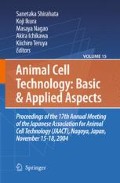Abstract
We have previously established germ-free ovalbumin- (OVA) specific T cell receptor transgenic (OVA-Tg) mice to examine the direct effects of intestinal bacteria on intestinal immune responses to dietary antigen. We prepared the intestinal immune cells from Peyer’s patches and lamina propria in the small intestine derived from germ-free (GF) or conventional (CV) mice, and demonstrated that the immunocytes from GF mice showed higher cytokine production in response to OVA antigen compared with those from CV mice. This suggested that intestinal bacteria could regulate cytokine production in response to OVA antigen. In this study, we investigated the effects of stimulation of antigen presenting cells (APCs) by intestinal bacteria on antigen-specific immune responses by using germ-free OVA-Tg mice. Lactobacillus and Bacteroides, which were isolated from murine intestinal bacteria, were inactivated by UV exposure. Thy1.2− cells, APCs of mesenteric lymph nodes (MLN) representing the gut associated lymphoid tissues, and MLN CD4+ T cells were prepared from GF Balb/c and OVA-Tg mice respectively. These cells were co-cultured with OVA and intestinal bacteria, and cytokines (IFN-γ, IL-10) in the supernatants were then assayed by ELISA. Both Lactobacillus and Bacteroidess enhanced OVA-specific cytokine production when the cells were stimulated with bacteria and OVA together. On the other hand, the pre-stimulation of APCs with Lactobacillus down-regulated OVA-specific cytokine production by CD4+ T cells. However Bacteroides did not enhance OVA-specific IFN-γ production significantly. These results suggested that Lactobacillus might modulate antigen-specific T cell responses via APCs differently from Bacteroides.
Access this chapter
Tax calculation will be finalised at checkout
Purchases are for personal use only
References
Fujioka, M., S. Hachimura, A. Hosono, R. Nakamura, K. Hirayama, K. Itoh, and S. Kaminogawa. 2004. Establishment and analysis of germ free T cell receptor transgenic mice. Animal Cell Technology: Basic & Applied Aspects 13:243.
Takeuchi, O., K. Hoshino, T. Kawai, H. Sanjo, H. Takada, T. Ogawa, K. Takeda, and S. Akira. 1999. Differential roles of TLR2 and TLR4 in recognition of gram-negative and gram-positive bacterial cell wall components. Immunity 11:443.
Poltorak, A., X. He, I. Smirnova, M. Y. Liu, C. Van Huffel, X. Du, D. Birdwell, E. Alejos, M. Silva, C. Galanos, M. Freudenberg, P. Ricciardi-Castagnoli, B. Layton, and B. Beutler. 1998. Defective LPS signaling in C3H/HeJ and C57BL/10ScCr mice: mutations in Tlr4 gene. Science 282:2085.
Qureshi, S. T., L. Lariviere, G. Leveque, S. Clermont, K. J. Moore, P. Gros, and D. Malo. 1999. Endotoxin-tolerant mice have mutations in Toll-like receptor 4 (Tlr4). Journal of Experimental Medicine 189:615.
Acknowledgements
We thank Dr. Sonoko Habu and Dr. Takehito Sato (Tokai University, School of Medicine) for generously providing the TCR-transgenic mice.
Author information
Authors and Affiliations
Editor information
Editors and Affiliations
Rights and permissions
Copyright information
© 2008 Springer Science+Business Media B.V.
About this paper
Cite this paper
Tsuda, M. et al. (2008). Murine Intestinal Bacteria Modulate Antigen-Specific Cytokine Production by Intestinal Immune Cells Derived from Germ-Free TCR-Transgenic Mice. In: Shirahata, S., Ikura, K., Nagao, M., Ichikawa, A., Teruya, K. (eds) Animal Cell Technology: Basic & Applied Aspects. Animal Cell Technology: Basic & Applied Aspects, vol 15. Springer, Dordrecht. https://doi.org/10.1007/978-1-4020-9646-4_17
Download citation
DOI: https://doi.org/10.1007/978-1-4020-9646-4_17
Published:
Publisher Name: Springer, Dordrecht
Print ISBN: 978-1-4020-9645-7
Online ISBN: 978-1-4020-9646-4
eBook Packages: Biomedical and Life SciencesBiomedical and Life Sciences (R0)

